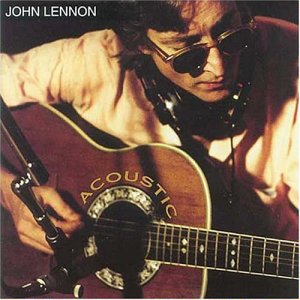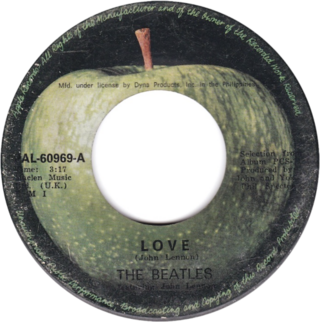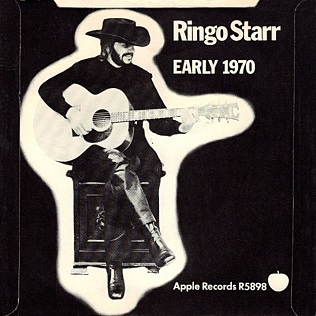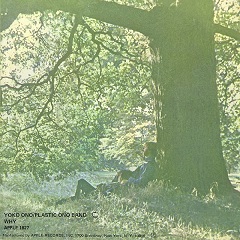
John Lennon/Plastic Ono Band is the debut solo studio album by English musician John Lennon. Backed by the Plastic Ono Band, it was released by Apple Records on 11 December 1970 in tandem with the similarly titled album by his wife, Yoko Ono. At the time of its issue, John Lennon/Plastic Ono Band received mixed reviews overall, but later came to be widely regarded as Lennon's best solo album.

Some Time in New York City is the third collaborative studio album, and first live album by John Lennon and Yoko Ono as Plastic Ono Band, a double album, it includes backing by the American rock band Elephant's Memory. Released in June 1972 in the US and in September 1972 in the UK on Apple Records, it is Lennon's sixth album to be released under his own name, and his fourth collaboration with Ono. Like Lennon's previous solo albums, it was co-produced by Lennon, Ono and Phil Spector. The album's agitprop lyrics are politically charged compared to its predecessors, addressing political and social issues and topics such as sexism, incarceration, colonialism, and racism.

Acoustic is a compilation album of John Lennon demos, studio and live performances that feature his acoustic guitar work and was released in 2004. Although it failed to chart in the United Kingdom, Acoustic reached number 31 in the United States with sales of 27,858 copies, becoming John Lennon's best charting posthumous US release since 1988's Imagine: John Lennon soundtrack. It spent eight weeks on the chart.

"Give Peace a Chance" is an anti-war song written by John Lennon, and recorded with the participation of a small group of friends in a performance with Yoko Ono in a hotel room in Montreal, Quebec, Canada. Released as a single in July 1969 by the Plastic Ono Band on Apple Records, it is the first solo single issued by Lennon, released while he was still a member of the Beatles, and became an anthem of the American anti-war movement during the 1970s. It peaked at number 14 on the Billboard Hot 100 and number 2 on the British singles chart.

"Yer Blues" is a song by the English rock band the Beatles, from their 1968 double album The Beatles. Though credited to Lennon–McCartney, the song was written and composed by John Lennon during the Beatles' retreat in Rishikesh, India. The song is a parody of blues music, specifically English imitators of blues.

"Cold Turkey" is a song written by English singer-songwriter John Lennon, released as a single in 1969 by the Plastic Ono Band on Apple Records, catalogue Apples 1001 in the United Kingdom, Apple 1813 in the United States. It is the second solo single issued by Lennon and it peaked at number 30 on the Billboard Hot 100 and number 14 on the UK Singles Chart. The song's first appearance on an album was Live Peace in Toronto 1969 where the song had been performed live on 13 September 1969 with Lennon reading the lyrics off a clip-board.

"Working Class Hero" is a song by John Lennon from his 1970 album John Lennon/Plastic Ono Band, his first album after the break-up of the Beatles.

"Dear Prudence" is a song by the English rock band the Beatles from their 1968 double album The Beatles. The song was written by John Lennon and credited to the Lennon–McCartney partnership. Written in Rishikesh during the group's trip to India in early 1968, it was inspired by actress Mia Farrow's sister, Prudence Farrow, who became obsessive about meditating while practising with Maharishi Mahesh Yogi. Her designated partners on the meditation course, Lennon and George Harrison, attempted to coax Farrow out of her seclusion, which led to Lennon writing the song.

"Why Don't We Do It in the Road?" is a song by the English rock band the Beatles, released on their 1968 double album The Beatles. Short and simple, it was written and sung by Paul McCartney, but credited to Lennon–McCartney. At 1:42, "Why Don't We Do It in the Road?" comprises 34 bars of a twelve-bar blues idiom. It begins with three different percussion elements and features McCartney's increasingly raucous vocal repeating a simple lyric with only two different lines.

"Julia" is a song by the English rock band the Beatles from their 1968 double album The Beatles. It is performed as a solo piece by John Lennon. The song was written by Lennon about his mother Julia Lennon, who died in 1958 at age 44.
"What's the New Mary Jane" is a song written by John Lennon and performed by the English rock band the Beatles. It was recorded in 1968 during sessions for the double album The Beatles, but did not appear on that album.

"Love" is a song written and performed by John Lennon, originally released on his debut solo album John Lennon/Plastic Ono Band (1970). The song's theme is more upbeat than most of the songs on Plastic Ono Band.
"Grow Old with Me" is one of the final songs written by John Lennon. It was first recorded by Lennon as a demo while in Bermuda. A handwritten lyric sheet for the song is dated July 5, 1980 Fairyland Bermuda. The song was first released on the posthumous album Milk and Honey in 1984. It was also rumoured to be among the songs planned as a possible reunion single by his former bandmates during the making of The Beatles Anthology.
"Well Well Well" is a song by the English musician John Lennon from his 1970 album John Lennon/Plastic Ono Band. The eighth and longest track on the album, "Well Well Well" features an aggressive guitar sound, screaming vocals and a pounding backing track.

"Early 1970" is a song by the English rock musician Ringo Starr that was released as the B-side of his April 1971 single "It Don't Come Easy". A rare example of Starr's songwriting at the time, it was inspired by the break-up of the Beatles and documents his relationship with his three former bandmates. The lyrics to the verses comment in turn on Paul McCartney, John Lennon and George Harrison as individuals, and the likelihood of each of them making music with Starr again. In the final verse, Starr offers a self-deprecating picture of his musical abilities and expresses the hope that all four will play together in the future. Commentators have variously described "Early 1970" as "a rough draft of a peace treaty" and "a disarming open letter" from Starr to Lennon, McCartney and Harrison.

"My Mummy's Dead" is the closing song on the album John Lennon/Plastic Ono Band by John Lennon. The song was also released on a Mexican EP that also contained "Mother", "Isolation" and "Look at Me".

"I'm Losing You" is a song written by John Lennon and released on his 1980 album Double Fantasy. It was written in Bermuda in June 1980, after several attempts by Lennon to call his wife, Yoko Ono, who remained in New York. The song is also available on the 1982 compilation The John Lennon Collection, the 1998 boxset John Lennon Anthology, the one disc compilation Wonsaponatime, the 2005 two disc compilation Working Class Hero: The Definitive Lennon and in 2010 for the Gimme Some Truth album. The song was also featured in the 2005 musical Lennon.

"Why" is a song written by Yoko Ono that was first released on her 1970 Yoko Ono/Plastic Ono Band album. In the U.S. it was also released as the B-side of John Lennon's "Mother" single, taken from his John Lennon/Plastic Ono Band album.

"Touch Me" is a song written by Yoko Ono that was first released on her 1970 album Yoko Ono/Plastic Ono Band. An edited version was later released in the U.S. as the b-side to John Lennon's single "Power to the People."

"Remember Love" is a song written by Yoko Ono and initially released as the B-side of John Lennon's and Ono's 1969 single "Give Peace a Chance."














